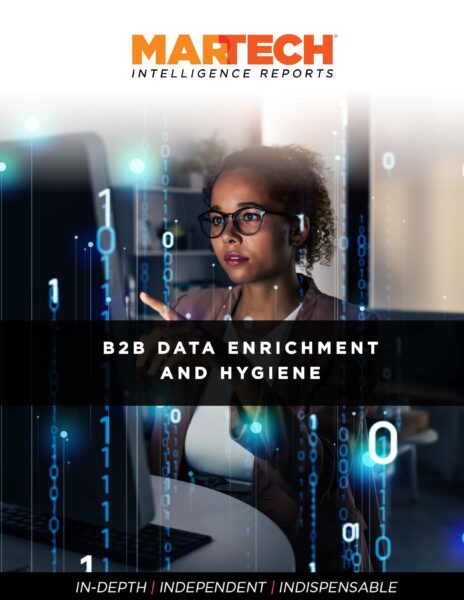
There’s growing recognition that clean, enriched data is critical for targeting and automation in B2B sales and marketing. As a result, the landscape of B2B data vendors is extensive, with providers specializing in data collection and augmentation.
As with any popular market, consolidation and investment in the B2B data space have been significant, with larger platforms acquiring data providers to enhance their offerings. Among the most prominent acquisitions, Demandbase acquired InsideView/DemandMatrix, 6sense acquired Slintel, ZoomInfo acquired RingLead and HubSpot acquired Clearbit.
For marketing and marketing operations professionals, it’s past time to recognize that data enrichment and hygiene are strategic, ongoing commitments to effectively navigate the complex B2B landscape, deliver personalization, ensure privacy compliance and drive ROI.
Here are five key things to do when engaging with B2B data enrichment and hygiene providers.
Dig deeper: Download our MarTech Intelligence Report on B2B Data Enrichment and Hygiene Vendors
1. Determine needs and goals
Before engaging vendors, identify your organization’s specific data quality challenges and what you hope to achieve.
Ask questions like:
- Have we outgrown current practices, spending too much time on manual data cleaning or dealing with bounces?
- What capabilities are critical? Consider the need for global company information, direct dial phone numbers, technographics, email verification or deduplication tools
Define objectives before engaging with vendors. These objectives could include improving email deliverability, reducing duplicate records, increasing data completeness or enhancing account profiles for better sales productivity.
Understanding these needs will help you assess if a solution is necessary and prioritize features when evaluating vendors.
2. Thoroughly assess integration requirements with your existing tech stack
Any data solution needs to seamlessly connect with your current systems. Identify all the tools the solution will need to integrate with, particularly your CRM (like Salesforce, Microsoft Dynamics, HubSpot), marketing automation platform (like Marketo, Oracle Eloqua, HubSpot, and Salesforce Account Engagement, formerly Pardot), data warehouse and any existing email or address verification tools.
Many data vendors offer native integrations or APIs, but their capabilities and associated costs vary significantly. Ensuring compatibility is crucial for streamlining workflows and avoiding manual work.
3. Identify your ‘must-have’ capabilities and prepare detailed business information for vendors
Create a list distinguishing between your current data quality capabilities, those you’d like to have and those you cannot live without. The “can’t live without” list is critical for avoiding costly mistakes.
When you contact vendors, provide them with detailed information about your business needs, including current data volumes and quality issues, specific fields for enrichment/validation, standardization requirements, geographic regions, industry-specific needs and compliance requirements.
That helps vendors understand your context and facilitates a relevant response. Using a formal RFI/RFP process can also help you make direct comparisons since all vendors the same list of requirements.
4. Schedule and conduct thorough demos, asking specific, probing questions
Once you’ve narrowed down vendors, schedule demos and involve potential users from your team. During the demo, assess the solution’s ease of use and if the vendor truly understands your business and data quality needs.
Ask for demonstrations of your “must-have” features and specific coverage for your industry or region.
Prepare a list of detailed questions about their data, including:
- How fresh is the data and how often is it updated?
- Details about their validation process.
- Typical match and accuracy rates
- How do they handle international data?
- Details of their deduplication/standardization capabilities.
Also, ask for details about their implementation/onboarding, support, compliance program, data sourcing methods and whether you can test with a sample of your data.
5. Check references and negotiate key commitments in writing in the contract
Before making a final decision, check online reviews and speak with one or two customer references, ideally from a business similar to yours. Ask references about their experience with data accuracy, cleansing tools, implementation time, customer service responsiveness, challenges and how they measure ROI.
When negotiating the contract, ensure key commitments are in writing. These should include minimum guaranteed match rates, data accuracy standards, completeness levels, update frequency, service level agreements (SLAs), transparent pricing for additional usage, integration support costs, compliance guarantees, and termination terms if quality standards are not met.
Getting these commitments upfront helps ensure fewer surprises and provides recourse if the vendor fails to meet expectations.

Download the MarTech Intelligence Report for B2B Data Enrichment and Hygiene Vendors‘ (registration required), which includes profiles of 12 B2B data enrichment and hygiene vendors, pricing information, capabilities comparisons and more recommendations for evaluating and purchasing.
The post 5 tips for marketers planning to evaluate B2B data vendors appeared first on MarTech.
